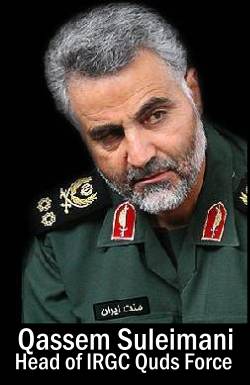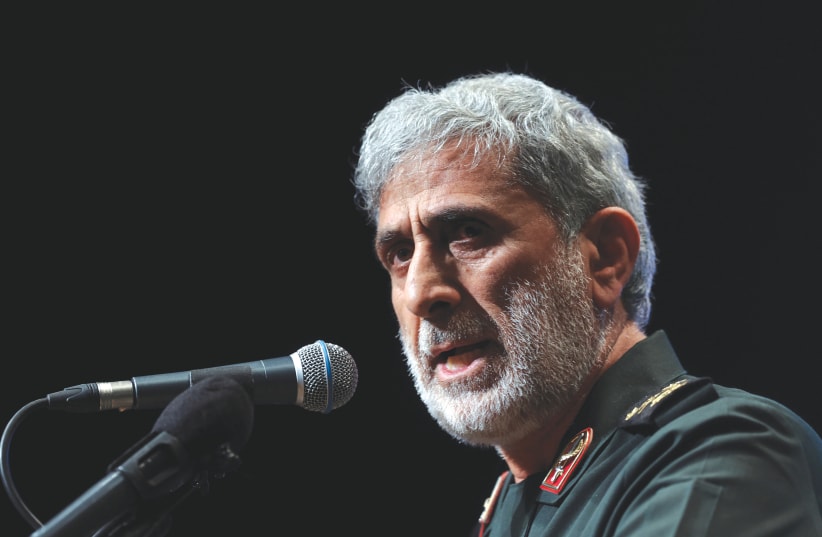Iran
...a theocratic Shiite state divided among the Medes, the Persians, and the (Arab) Elamites. Formerly a fairly civilized nation ruled by a Shah, it became a victim of Islamic revolution in 1979. The nation is today noted for
spontaneouslytaking over other countries' embassies, maintaining whorehouses run by clergymen, involvement in international drug trafficking, and financing sock puppet
militiasto extend the regime's influence. The word
Iranis a cognate form of
Aryan.The abbreviation
IRGCis the same idea as
Stürmabteilung (or SA).The term
Supreme Guideis a the modern version form of either
Duceor
Führeror maybe both. They hate
is reportedly building a major spaceport as part of an effort to maintain its regional prowess following major blows to its proxies across the Middle East.
Bloomberg detailed the Islamic Theocratic
Republic’s plans to build the facility, likened to Florida’s Cape Canaveral, in Chabahar, a launch site close to the equator, making it more efficient for launches.
The site, which was supposed to open last year, will contain a 54-square-mile complex, allowing Iran to launch powerful spacecraft into orbit, the Friday report said.
The program has reportedly raised concerns among Western nations — particularly the US and Israel — that Iranian space technology could be used to advance the country’s intercontinental ballistic missile (ICBM) capabilities.
"Iran’s work on space-launch vehicles — including its two-stage, liquid-fueled Simorgh satellite carrier rocket — likely shortens the timeline to produce an ICBM due to the similarities in technology," General Anthony Cotton, commander of US Strategic Command, told the Senate Armed Services Committee last month.
One of the program’s reported aims is to send to space 20 internet satellites named after Qassem Soleimani
 , the Iranian Revolutionary Guards Corps Quds Force commander killed by a US drone in 2020.
, the Iranian Revolutionary Guards Corps Quds Force commander killed by a US drone in 2020.With more satellites, Iran could better guide its long-range weapons, according to the report. John Sheldon, an Abu Dhabi-based founding partner at AstroAnalytica, a space consulting firm, was quoted as saying the Iranians "could become much more precise in their targeting and have quicker reaction times to launch their own ballistic missile forces to hit targets much more precisely."
The report did not provide precise figures regarding the costs of the program, though a senior Iranian official reportedly said last November that approximately $11 million would be provided to Iran’s space agency, despite the sanctions that have crippled the Iranian economy.
According to the report, the program is also being supported by Iran’s strategic relationship with Russia, as both countries face sanctions from the West. Russian President Vladimir Putin
...President-for-Life of Russia. He gets along well with other presidents for life. He is credited with bringing political stability and re-establishing something like the rule of law, which occasionally results in somebody dropping dead from poisoning by polonium or other interesting substance. Under Putin, a new group of business magnates controlling significant swathes of Russia's economy has emerged, all of whom have close personal ties to him. The old bunch, without close personal ties to Putin, are in jail or in exile or dead from poisoning by polonium or other interesting substances...
and Iranian President Masoud Pezeshkian signed a 20-year strategic pact in January.
"What Russia definitely has is the expertise," Juliana Suess, a researcher at the German Institute for International and Security Affairs, was quoted as saying. "That’s something that Iran is after."
In October, two Iranian-made satellites were sent into orbit from Russia. Iranian drones have also been used throughout Russia’s invasion of Ukraine.
The advancement of the program has led the UK and the EU to sanction Brigadier General Ali Jafarabadi, who leads the IRGC’s space division. The UK has also sanctioned the Iranian Space Agency.
"Our enemies constantly try to prevent us from standing on our own feet, but this has driven us to achieve scientific and technological advancements," Pezeshkian said of the program in February.
Matthew Schmidt, an associate professor of national security and political science at the University of New Haven, told Bloomberg that the Iranian space program’s advancements are motivated by the blows the country’s proxies were recently dealt in Leb
 ...an Iranian satrapy until recently ruled by Hassan Nasrallah situated on the eastern Mediterranean, conveniently adjacent to Israel...
...an Iranian satrapy until recently ruled by Hassan Nasrallah situated on the eastern Mediterranean, conveniently adjacent to Israel...and Syria.
"Iran has a need now, especially after the losses of its proxy power to Israel, to reestablish some kind of pathway to do power projection," he said. "They see space technology and aeronautical technology as a place to do it."
Iran has not explicitly said whether the program is intended for military purposes, claiming that its goal is to achieve the same technological capabilities as Western countries.
However,
those who apply themselves too closely to little things often become incapable of great things...
Iran has called for the destruction of Israel for decades and launched barrages of long-range missiles at its adversary twice in the past year.
The Islamic Theocratic
Republicrecently began negotiations with the US on its nuclear program, aiming to reach a deal that will ease sanctions. It is unclear whether the Omani-mediated talks are making headway.
Iran claims that its nuclear program is intended only for civilian purposes, but it nevertheless has enriched uranium to levels that are only necessary for developing an atomic bomb.

 ..the braying voice of Islamic Resistance®,...
..the braying voice of Islamic Resistance®,... ...an Iranian satrapy until recently ruled by Hassan Nasrallah situated on the eastern Mediterranean, conveniently adjacent to Israel. Formerly inhabited by hardy Phoenecian traders, its official language is now Arabic, with the usual unpleasant side effects. The Leb civil war, between 1975 and 1990, lasted a little over 145 years and produced 120,000 fatalities. The average length of a ceasefire was measured in seconds. The Lebs maintain a precarious sectarian balance among Shiites, Sunnis, and about a dozen flavors of Christians, plus Armenians, Georgians, and who knows what else? It is the home of the original Hezbollah, which periodically starts a war with the Zionist Entity, gets Beirut pounded to rubble, and then declares victory and has a parade. The Lebs have the curious habit of periodically murdering their heads of state or prime ministers...
...an Iranian satrapy until recently ruled by Hassan Nasrallah situated on the eastern Mediterranean, conveniently adjacent to Israel. Formerly inhabited by hardy Phoenecian traders, its official language is now Arabic, with the usual unpleasant side effects. The Leb civil war, between 1975 and 1990, lasted a little over 145 years and produced 120,000 fatalities. The average length of a ceasefire was measured in seconds. The Lebs maintain a precarious sectarian balance among Shiites, Sunnis, and about a dozen flavors of Christians, plus Armenians, Georgians, and who knows what else? It is the home of the original Hezbollah, which periodically starts a war with the Zionist Entity, gets Beirut pounded to rubble, and then declares victory and has a parade. The Lebs have the curious habit of periodically murdering their heads of state or prime ministers... ...Arabic term meaning
...Arabic term meaning  [JPost]
[JPost]